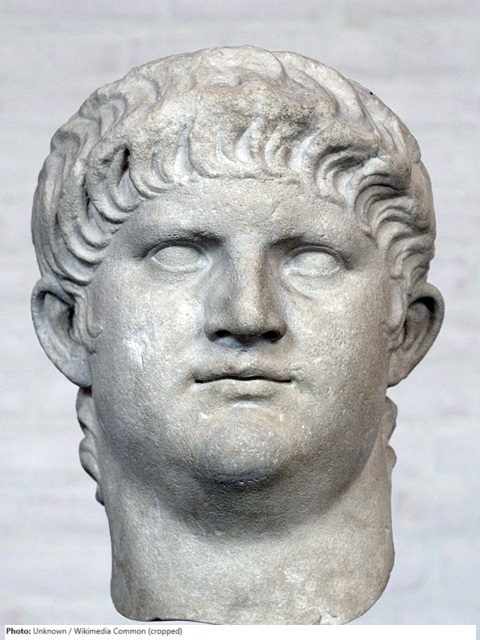
| Roles | Competed in Ancient Olympic Games |
|---|---|
| Sex | Male |
| Full name | Nero Claudius Caeser Augustis Germanicus |
| Used name | •Nero, Emperor of Roma |
| Other names | Tiberius Claudius Nero Caesar |
| Born | 15 December 37 in Roma, Roma (ITA) |
| Died | 9 June 68 (aged 30 years 5 months 25 days) in Roma, Roma (ITA) |
| Title(s) | Emperor |
| NOC |  Roma Roma |
| Medals | AG |
| Gold | 7 |
| Silver | 0 |
| Bronze | 0 |
| Total | 7 |
Nero was an Emperor of Roma whose reign was rather notorious. Athletically he wished to become an Olympic champion, and as he was the Emperor, the Olympic rulers wished not to anger him. He also wanted to become periodonikes by winning at the four major Greek athletic festivals – Olympia, Isthmia, Pythia, and Nemea, and he wanted to do it all in one year. Thus, the 65 CE Olympics were postponed until 67 CE so he could “compete” at all four festivals in the same year.
At the 67 CE Olympics Nero was awarded seven crowns, in the chariot race; chariot race for 10 horses; chariot race for foals; competition for heralds; competition for tragedy; competition for lyre-playing; and in an unknown event. Several of the events were made expressly for him and were never held again. In one chariot race, he drove the chariot, fell out of it, and did not finish the race, but was still declared the victor.
As Emperor, Nero ruled from 54 to 68 CE. Early in his reign he was mostly guided by his mother, Agrippina; his tutor, Seneca; and his Praetorian prefect, Afranius Burrus. The Roman military had several successful campaigns under Nero, led by general Suetonius Paulinus, but Nero focused mostly on diplomacy and trade. He also made appearances as an actor, poet, musician, and charioteer, which undermined the dignity of his office in the eyes of traditional Romans.
During his time as Emperor the Great Fire of Roma occurred, during which it is rumored that Nero fiddled “while Rome burned.” In 68 CE governor of the Gaulish territory Gallia Lugdunensis, with support from Galba, governor of Hispania Tarraconensis, began a coup to overtake Nero. This failed but the civilian and military authorities chose Galba to take over as Emperor and Nero fled Roma. He was tried in absentia and condemned to death as a public enemy, after which Nero took his own life on 9 June 68.
| Games | Discipline (Sport) / Event | NOC / Team | Pos | Medal | As | |
|---|---|---|---|---|---|---|
| 67 CE Ancient Olympics | Ancient Combative Sports (Ancient Sports) |  ROM ROM |
Nero, Emperor of Roma | |||
| Ancient Equestrianism (Ancient Sports) |  ROM ROM |
Nero, Emperor of Roma | ||||
| Unknown Event, Men (Ancient Olympics) | 1 | Gold | ||||
| Chariot Race, Men (Ancient Olympics) | 1 | Gold | ||||
| Chariot Race for 10 Horses, Men (Ancient Olympics) | 1 | Gold | ||||
| Chariot Race for Foals, Men (Ancient Olympics) | 1 | Gold | ||||
| Ancient Art Competitions (Ancient Sports) |  ROM ROM |
Nero, Emperor of Roma | ||||
| Competition for Heralds, Men (Ancient Olympics) | 1 | Gold | ||||
| Competition for Tragedy, Men (Ancient Olympics) | 1 | Gold | ||||
| Competition for Lyre-Playing, Men (Ancient Olympics) | 1 | Gold |